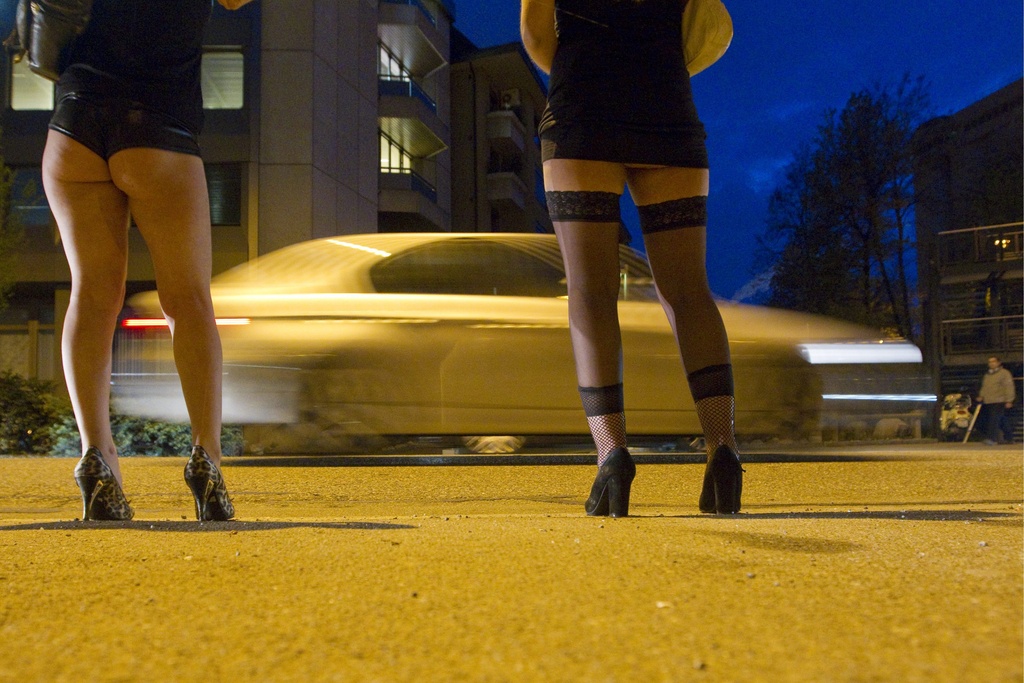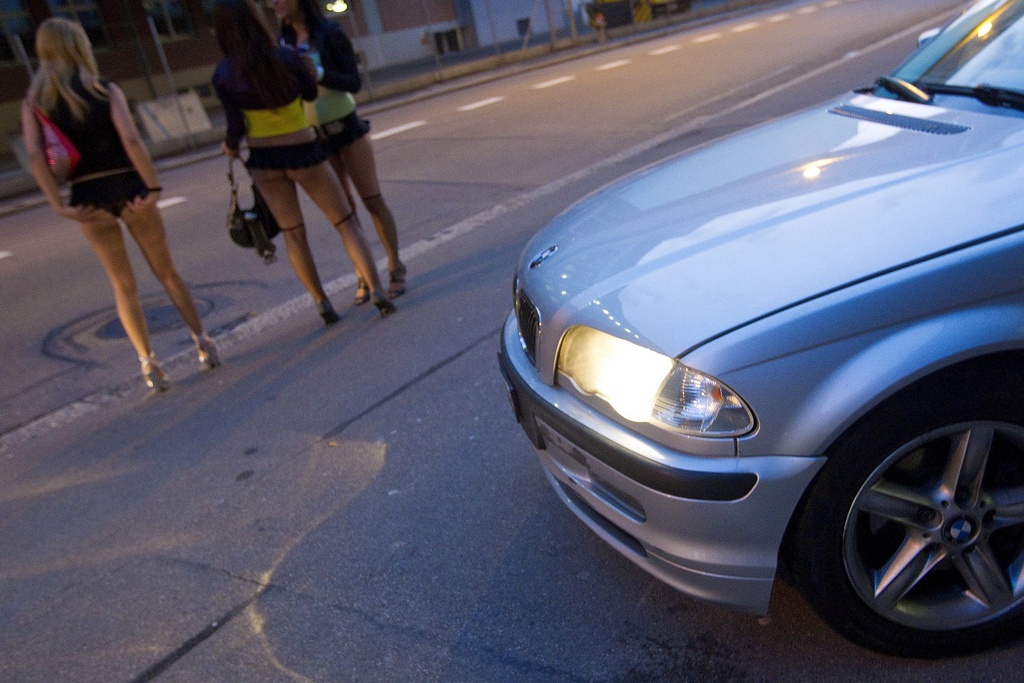Zurich takes aim at human trafficking

One of the largest ever trials of defendants accused of trafficking women has been held in Zurich, shining the spotlight on the growing problem of forced prostitution.
In court on Wednesday and Thursday were four alleged Hungarian pimps who are accused, among other things, of treating prostitutes with extreme brutality. A woman who was herself trafficked also faced charges of helping the pimps by checking on the women in the street.
Prosecutors asked for up to 16 years’ prison for the principal defendant and sentences of between 4.5 and 11 years for the others. They want a suspended fine for the woman.
The defence lawyers have pleaded for short sentences – some of them suspended – or acquittal.
The large number of victims – 16 – who have agreed to go into the witness stand made the two-day hearing one of the biggest of its kind ever to be held in Switzerland.
Public prosecutor Silvia Steiner, who specialises in organised crime, has already dealt with several cases of the trafficking of women and forced prostitution.
In her address to the court, she said the victims, many of whom are Roma women who come from Hungary and Romania, had endured “a social and emotional murder”.
“In the foreseeable future, none of them will be able to lead a normal life. They are the living dead,” she said.
Increasing problem
Prostitution is an increasing problem in Switzerland’s largest city. It is highly visible along the Sihlquai, a major traffic artery behind the main station, and has been causing problems – mess and nuisance – for people living in the surrounding districts.
The practice is legal for foreigners with a three-month temporary work permit as long as they operate independently. But criminals have become involved. As many of the clubs are outside Zurich, the city and cantonal authorities are finding it hard to keep the situation in check.
According to Steiner, the violence described by the victims is so great and so traumatising that it might even have been better for them to be spared the trauma of the witness box.
Apart from human trafficking and the promotion of prostitution, the pimps are also accused of inducing miscarriages by blows to the stomach, rape, bodily harm, endangering the lives of others and various offences under laws both on drugs and on foreigners’ right to temporary residence.
Lured by promises
Some of the victims, who come from poor backgrounds with no prospects for the future, came to Switzerland voluntarily, attracted by promises of quick money and being able to help their families.
“The introduction of the free movement of people and the abandonment of the need for a visa for countries such as Romania has made it easier for the criminals,” said Eva Zwahlen, spokeswoman for the Federal Police Office.
“For human trafficking, Switzerland remains an attractive country where big profits can be made with few risks in terms of prosecution,” she added.
In Zurich, Advocacy and Support for Migrant Women and Victims of Trafficking (FIZ), which is a pioneering organisation in Switzerland, is about to open a refuge for trafficked women.
The police office and especially its Swiss Coordination Unit against the Trafficking of Persons and Smuggling of Migrants (KSMM), recognise its good work.
Doro Winkler of FIZ thinks the legal system is adequate. “The law contains a good definition of what human trafficking is and the penalties available can be severe,” she said.
Strong signal
However, she finds there is, “a lack of sensitivity in certain courts in recognising the seriousness of these crimes. We are hoping that the Zurich trial will give a strong signal”.
Witnesses could soon benefit from an new legal instrument: a witness protection law is currently being prepared.
In Zurich, the victims who are testifying have been placed in a protection programme. “If necessary they will receive a new identity, a new existence,” prosecutor Steiner said.
But the justice authorities seem to be confronted with an uphill battle. “When we arrest five people one day, there are five new ones in their place the next,” observed Steiner, who is convinced the situation is the same in all the big cities in Europe.
“But perhaps the trial will help show potential clients that the Sihlquai prostitutes are not happy girls with colourful clothes, but victims of extreme brutality.”
The verdict is not expected until December 1.
Ariane Gigon in Zurich, swissinfo.ch (Adapted from French by Isobel Leybold-Johnson)
According to police checks – which only can offer part of the picture – in 2009 prostitution in the city increased by 20%. Police counted 3,778 people, of whom 314 came from Hungary.
The Federal Police Office says 14,000 prostitutes work in Switzerland, with around half here illegally. Three quarters come from abroad, mostly from eastern European countries.
Advocacy and Support for Migrant Women and Victims of Trafficking (FIZ) has pointed to a rise in human trafficking cases. Its specialised Makasi service registered 184 cases, 124 of which were new in 2009. 56% were women forced into prostitution.
According to the The Swiss Coordination Unit against the Trafficking of Persons and Smuggling of Migrants (KSMM), most of the affected women, whose ages range mainly from 17 to 25, come from these countries: Hungary, Romania and Bulgaria, Brazil and the Dominican Republic, Thailand, Nigeria and Cameroon.
The Zurich trial concerns 20 Hungarians – all of the accused, and all except one of the victims. The remaining victim is Romanian.
In June the Zurich police arrested 14 people, of whom 13 were Hungarian, as part of an investigation into human trafficking and pimping. 22 victims, aged 18-32, were questioned.
Zurich police have played a pioneering role. The KSMM organised a Swiss-Hungarian round table at their request, which took place in June 2009.
Since then police investigators have been visiting Hungary regularly.

In compliance with the JTI standards
More: SWI swissinfo.ch certified by the Journalism Trust Initiative














You can find an overview of ongoing debates with our journalists here . Please join us!
If you want to start a conversation about a topic raised in this article or want to report factual errors, email us at english@swissinfo.ch.